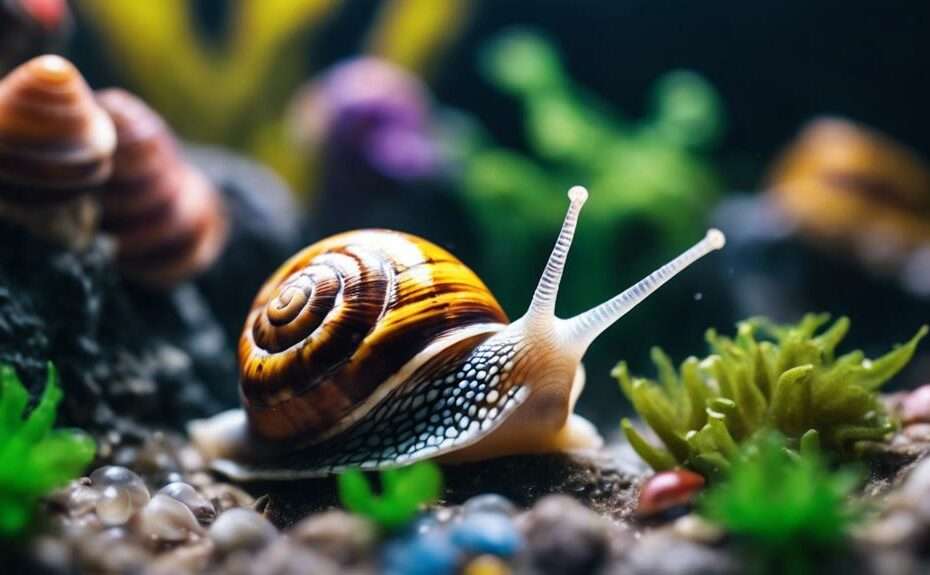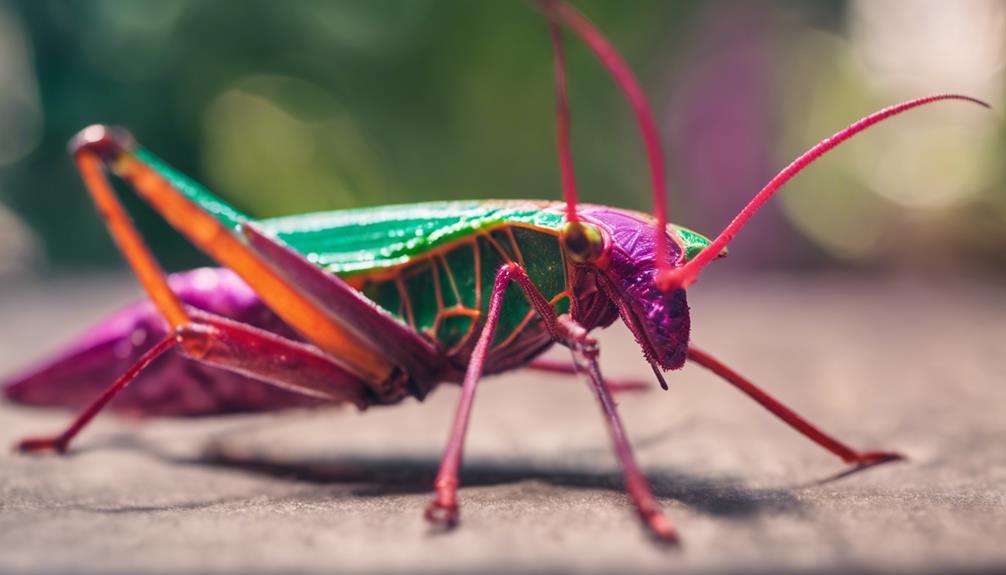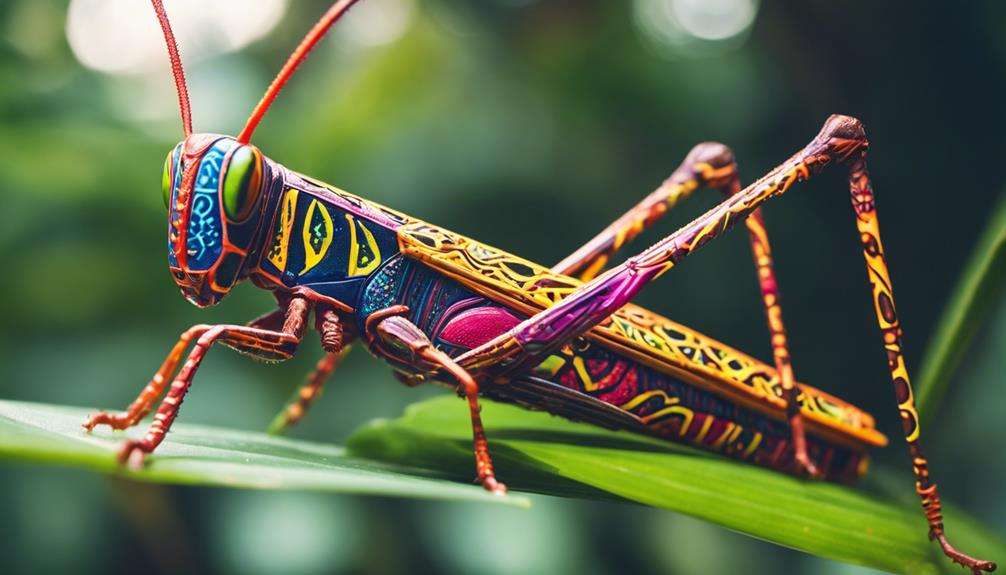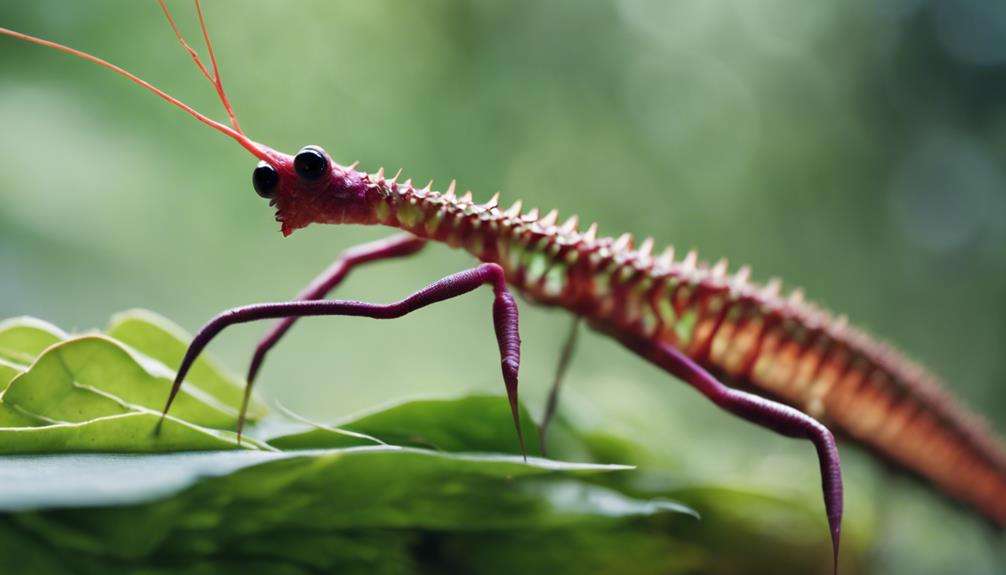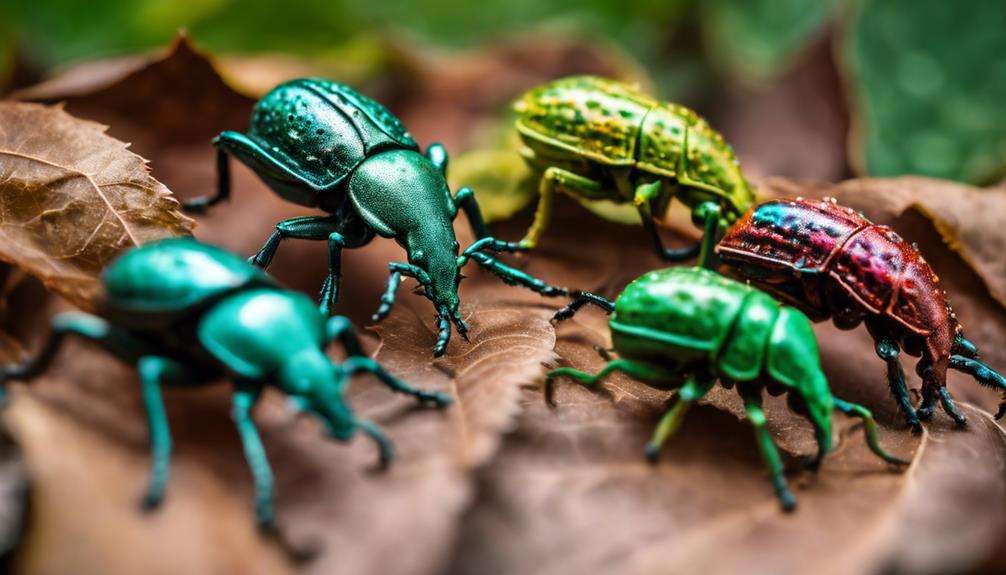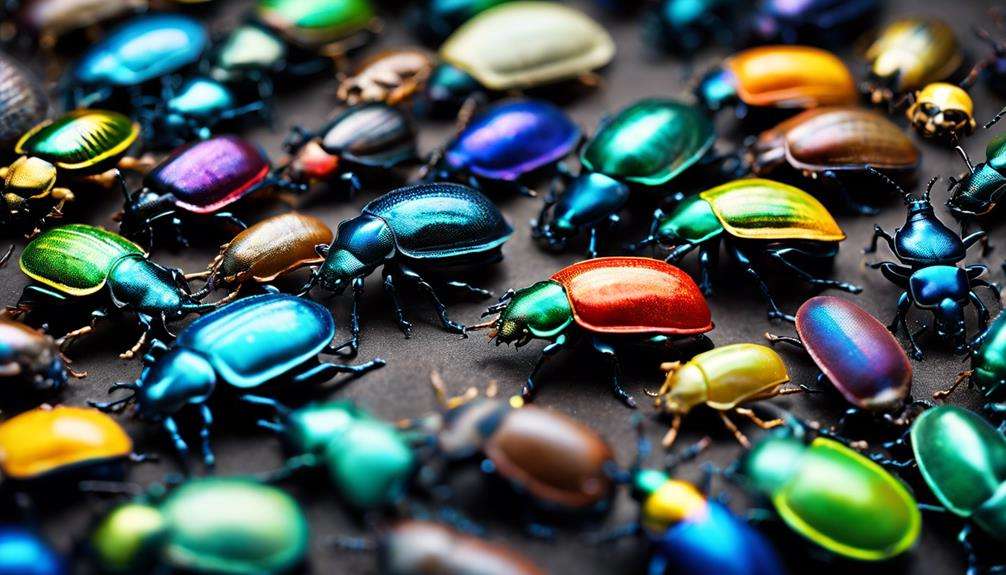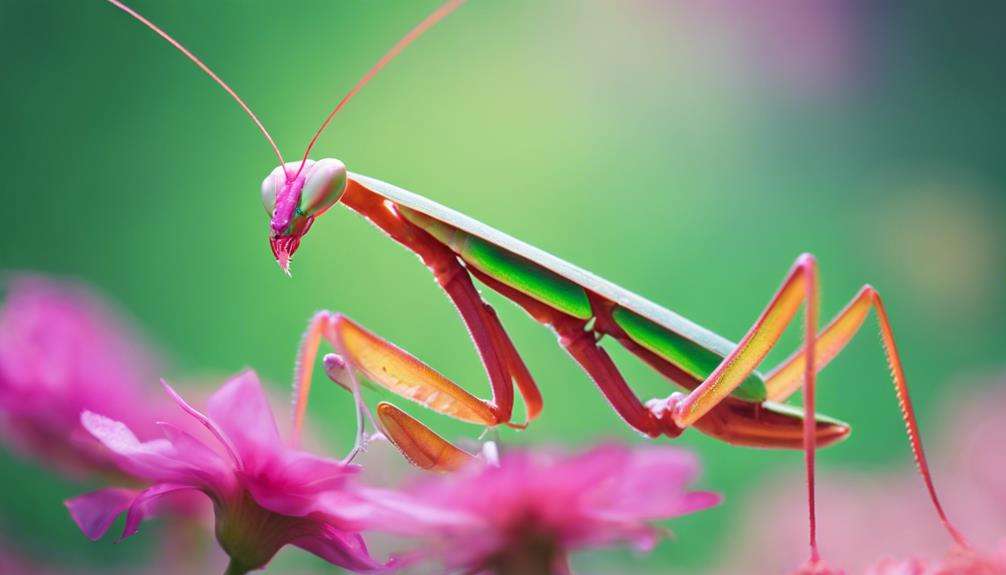You might think that snails are not the first choice when it comes to pets, but have you ever considered the benefits they can offer?
From their low-maintenance care to their fascinating behavior, snails have a lot to offer pet enthusiasts.
But there is one surprising reason that might make you reconsider your perspective on these often-overlooked creatures.
Key Takeaways
- Low maintenance and peaceful companions suitable for small spaces
- Unique observation opportunities due to slow movements
- Highly educational and ideal for busy individuals
- Diverse and unique snail species for pet enthusiasts
Benefits of Keeping Pet Snails
Consider the numerous advantages of having pet snails in your home. Snails make excellent pets due to their low maintenance nature, requiring minimal care and attention. They're peaceful and quiet creatures, making them ideal companions for small living spaces where noise levels need to be kept in check.
These fascinating creatures offer a unique opportunity for observation, with their slow-paced movements captivating the observer's attention. Additionally, keeping pet snails can be highly educational, especially for children interested in nature and biology.
The simplicity of caring for snails, combined with the benefits they bring in terms of relaxation and learning, make them a great choice for individuals seeking a pet that fits well into a busy lifestyle or limited living space. Embrace the tranquility and wonder that pet snails can bring into your home.
Unique Snail Species to Consider
When considering unique snail species as pets, explore rare varieties like the Giant African Snail with its striking appearance.
The White-lipped Banded Snail offers colorful shell patterns and adaptability, making it an intriguing choice.
Additionally, the Milk Snail's milky-white shell and peaceful demeanor, along with the predatory nature of the Rosy Wolf Snail, provide fascinating options for snail enthusiasts.
Rare Snail Varieties
Among the rare snail varieties suitable for consideration as pets, the Golden Apple Snail stands out for its vibrant colors and unique appearance.
The Rosy Wolf Snail is notable for its carnivorous diet, preying on other snails.
The Jewel Snail, with its glossy, colorful shell, adds visual appeal to aquariums.
Unfortunately, the Partula Snail species faces critical endangerment due to habitat loss and invasive species.
The Marisa Cornuarietis, or Giant Colombian Ramshorn Snail, is a larger freshwater snail popular in aquascaping for its algae-eating abilities.
When looking to add a unique touch to your pet collection, these rare snail varieties offer diversity in appearance, behavior, and conservation importance. Consider exploring these fascinating species to enhance your pet enthusiast experience.
Colorful Shell Patterns
Exploring the realm of unique snail species, one can't overlook the captivating array of colorful shell patterns exhibited by these fascinating creatures.
The Polymita snail species from Cuba stands out with its vibrant and intricate shell patterns, each snail boasting a unique color combination.
Partula snails from the Pacific Islands showcase diverse shell patterns, ranging from striped to spotted designs in various shades.
Cone snails boast striking geometric patterns on their shells, with some species possessing venomous harpoon-like teeth for hunting.
Marginella snails feature beautifully patterned shells with intricate spirals and colorful markings, appealing to collectors.
Trochus snails are recognized for their attractive, pearly shells adorned with concentric rings and vibrant hues, adding elegance to any aquarium.
Snail Care and Maintenance Tips
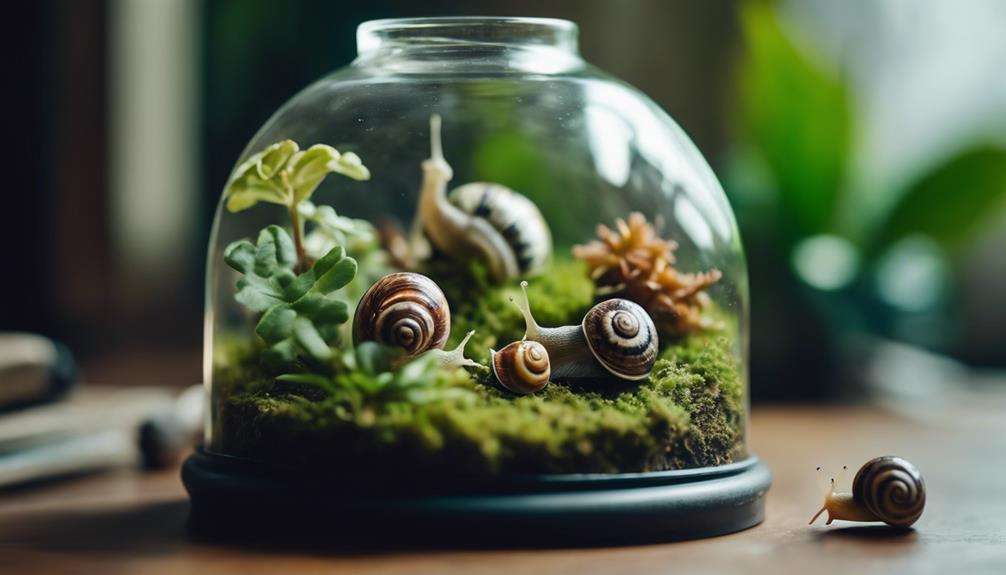
To ensure the well-being of your pet snails, it's essential to provide a suitable terrarium with natural substrates and a shallow dish of water for maintaining humidity. When caring for your snails, consider the following tips:
- Maintain Proper Humidity: Provide a shallow dish of water for snails to maintain humidity and prevent dehydration.
- Choose the Right Terrarium: House your snails in a glass or plastic terrarium with natural substrates like compost or sphagnum moss.
- Balanced Diet: Offer pesticide-free produce such as lettuce, bananas, and cucumbers to meet your pet snails' dietary needs.
- Calcium Sources: Ensure your snails have access to calcium sources like cuttlebone or ground eggshells to support shell growth and overall health.
Remember to handle your snails with care by scooping them up underneath their foot to avoid causing harm or stress. By following these maintenance tips, you can provide a healthy and comfortable environment for your pet snails.
Snails as Low-Maintenance Pets
Snails make excellent low-maintenance pets due to their easy care requirements and minimal time commitment. You won't need to set aside hours for walks, grooming sessions, or training exercises with these little creatures.
Their simple care routine and independent nature make them an ideal choice for those seeking a pet that fits seamlessly into a busy lifestyle.
Easy Care Tips
Are you curious about how to effortlessly care for these fascinating creatures, making them ideal low-maintenance pets for busy individuals? Here are some easy care tips for your snail companions:
- Feeding: Provide a diet of fruits and vegetables to keep your snail healthy and satisfied.
- Habitat: Maintain a suitable environment with proper humidity levels and substrate to ensure your snail's well-being.
- Cleaning: Regularly clean the enclosure to prevent any build-up of waste and bacteria.
- Minimal Attention: Snails don't require constant interaction, making them perfect for individuals with busy schedules.
Minimal Time Commitment
With their minimal time commitment and low-maintenance nature, snails make excellent pets for individuals with busy schedules. These self-sufficient creatures require simple habitat requirements and have a slow metabolism, reducing the need for constant care. Snails are easy to care for, needing no daily walks or grooming, making them suitable for busy owners who've limited time for pet care.
Their easy-care nature and minimal time requirements make them a convenient choice for pet enthusiasts seeking a companion that fits well into a hectic lifestyle. So, if you're looking for a low-maintenance pet that thrives with basic care and doesn't demand extensive attention, consider adding a snail to your home as a delightful and undemanding companion.
Snails' Fascinating Behavior
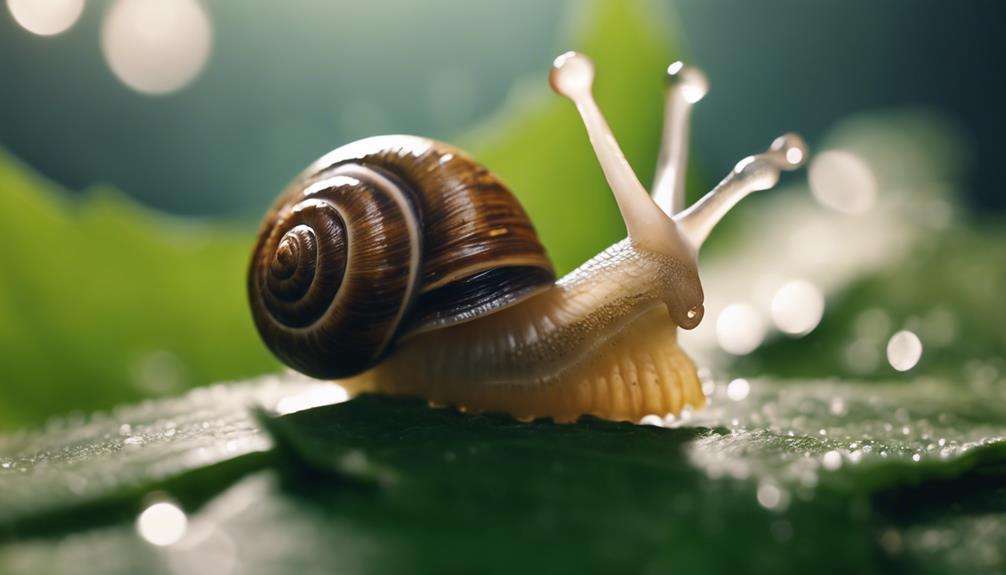
During adverse conditions, observe the fascinating hibernation behavior of snails. These creatures display intriguing behaviors that captivate pet enthusiasts.
Some of the most notable behaviors include:
- Slow Movement: Snails move at a leisurely pace, showcasing their relaxed and deliberate manner of exploration.
- Trail of Slime: The glistening slime left behind as they move isn't only a means of locomotion but also serves various essential functions.
- Nocturnal Behavior: Snails are primarily active during the night, adding a mysterious allure to observing their activities.
- Defense Mechanism: When sensing danger, snails retract into their shells, demonstrating a protective instinct that's fascinating to witness.
These behaviors contribute to the appeal of keeping snails as pets, providing a unique and educational experience for enthusiasts. Observing their hibernation, slow movements, nocturnal habits, and defense mechanisms can offer valuable insights into the natural world and the intricate behaviors of these fascinating gastropods.
Snails' Environmental Impact at Home
Snails, through their ecological activities, play a crucial role in enhancing the environmental quality of home ecosystems. These gastropods contribute significantly to soil recycling and nutrient cycling, which ultimately leads to improved plant growth. By consuming decaying plant matter, snails aid in waste decomposition, acting as natural fertilizers that enrich the soil and promote the health of plants in gardens. Furthermore, their movements and feeding habits help aerate the soil, enhancing drainage and fostering beneficial microorganisms essential for plant growth.
In controlled environments, such as terrariums or indoor gardens, snails can help maintain ecosystem balance by actively participating in waste decomposition and nutrient cycling. Their presence not only contributes to the overall health of the plants but also fosters a more sustainable and thriving environment. Therefore, considering snails as pets can bring about positive environmental impacts at home, supporting a healthier and more balanced ecosystem within your living space.
Snails' Surprising Intelligence

Snail intelligence is a remarkable aspect of these gastropods, demonstrated through their problem-solving abilities and cognitive skills. Snails exhibit surprising abilities that challenge traditional notions of their cognitive capabilities. Here are some key points to consider:
- Problem-solving: Snails show impressive problem-solving skills, navigating mazes and recalling solutions.
- Memory Retention: Research indicates that snails can learn and remember tasks, displaying memory retention.
- Social Behaviors: Some snail species exhibit social behaviors like group huddling for warmth and protection.
- Homing Behavior: Snails display homing behavior, returning to specific locations after being moved, showcasing spatial awareness.
These findings highlight the cognitive abilities of snails, including stimuli differentiation and learning and remembering tasks. Their surprising intelligence adds depth to their characteristics, making them intriguing pets for those looking to interact with a creature that defies expectations.
Snails' Therapeutic Benefits
One can experience reduced stress and anxiety by interacting with snails, benefiting from their calming presence and slow movements. The therapeutic benefits of snails extend to providing a soothing and tranquil environment for individuals seeking relaxation.
The peaceful nature and gentle behavior of snails offer a sense of comfort and mindfulness in daily life. Observing the rhythmic pace at which snails navigate their surroundings can serve as a mindfulness practice, promoting mental well-being and emotional stability.
The act of watching these creatures move slowly and deliberately can help pet enthusiasts unwind and find solace in the simplicity of nature. By incorporating snails into your life, you open the door to a world of serenity and inner peace, where the stresses of the day can fade away in the presence of these calming creatures.
Embrace the therapeutic benefits of snails and discover a newfound source of comfort and relaxation.
Snails as Educational Pets
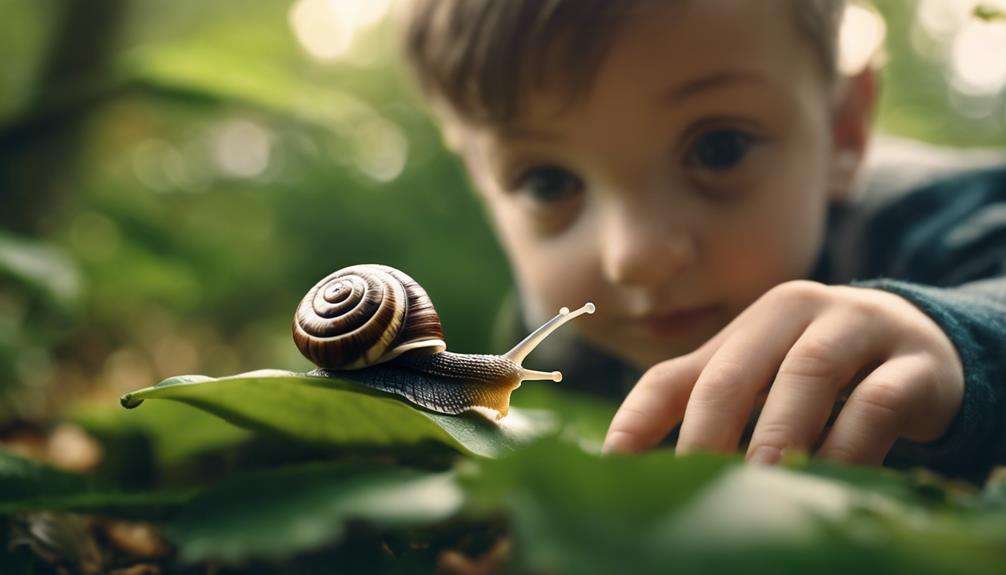
Consider incorporating snails into educational settings to engage children in hands-on learning experiences about biology, ecosystems, and responsibility.
Observing these fascinating creatures can provide valuable insights into their movement patterns, feeding habits, and life cycles. By caring for snails, children can develop a sense of empathy towards living organisms and nurture their curiosity about the natural world.
Studying snails not only offers educational benefits but also encourages children to take on responsibilities in maintaining a small ecosystem within their learning environment. These gastropods can serve as captivating subjects for various science projects, allowing students to delve deeper into topics like adaptation, reproduction, and environmental interactions.
Introducing snails as educational pets can create exciting opportunities for exploration and discovery, fostering a love for science and nature in young minds.
Frequently Asked Questions
Why Do People Keep Snails as Pets?
People keep snails as pets for their unique companionship, low maintenance, fascinating behavior, decorative shells, and peaceful nature. They offer educational benefits, are relaxing to watch, fit well in small spaces, are fun to observe, and provide an affordable option.
Are Snails Considered Pets?
Yes, snails are considered pets. They require specialized care to thrive. Pet snails, like Achatina fulica, can live up to 5 years. Providing a suitable habitat, proper diet, and enrichment activities are essential for their well-being and longevity.
Is It Ethical to Keep Snails?
Keeping snails ethically as pets involves respecting their needs, providing proper care, and promoting animal welfare. It's crucial to source them responsibly, offer suitable habitats, and ensure their well-being. Educate yourself on ethical pet ownership practices.
Are Snails Good Classroom Pets?
Snails make excellent classroom pets. Their low maintenance, fascinating behavior, and educational benefits engage students in hands-on learning. They are unique, budget-friendly, and environmentally sustainable pets that provide pet therapy and create a calming environment.
Conclusion
In conclusion, considering snails as pets can offer a unique and rewarding experience.
Did you know that a snail's slime contains proteins that can help regenerate human skin cells? This fascinating fact showcases the surprising intelligence and therapeutic benefits of these low-maintenance creatures.
So, next time you're looking for a peaceful and educational pet, don't overlook the humble snail. They may just become your new favorite companion.
